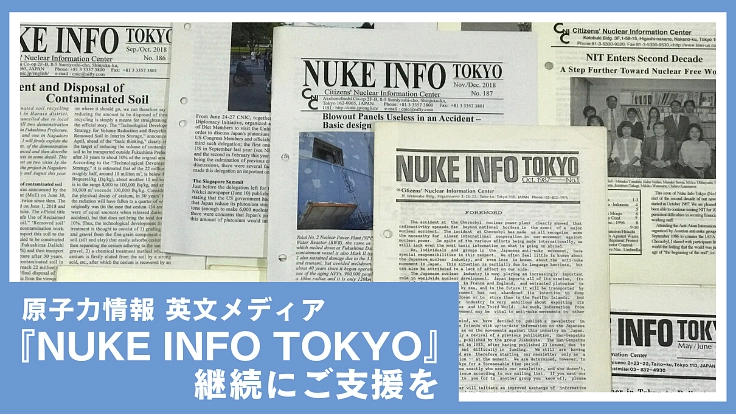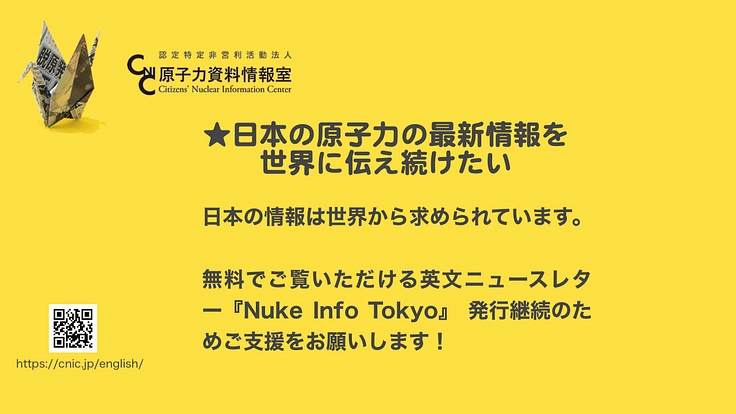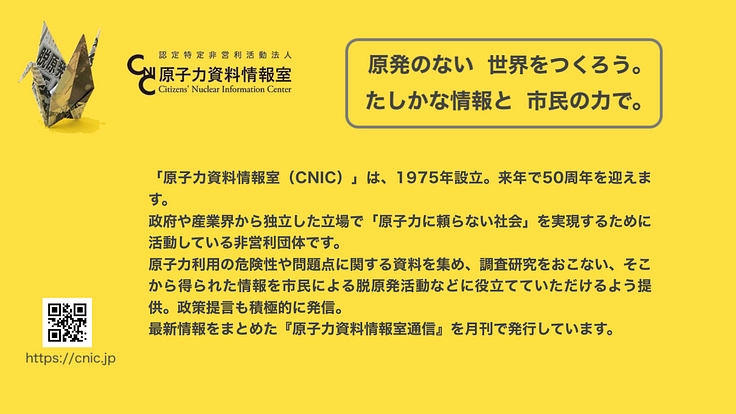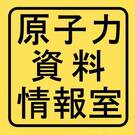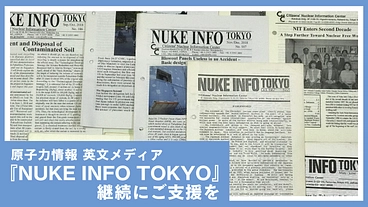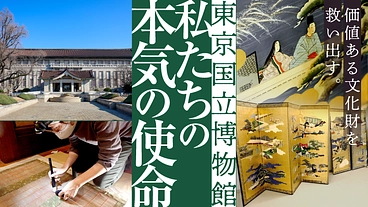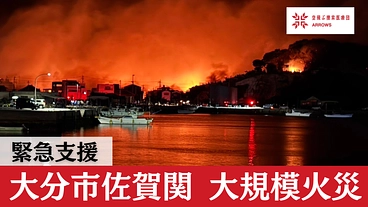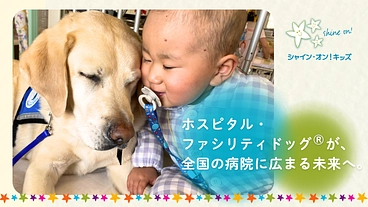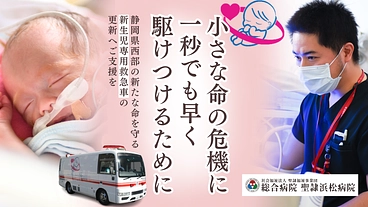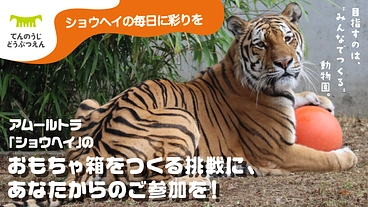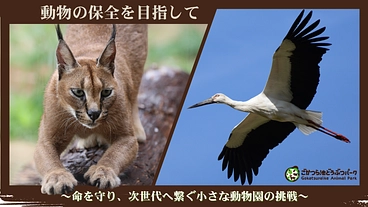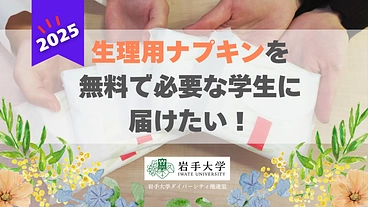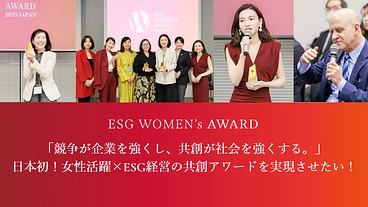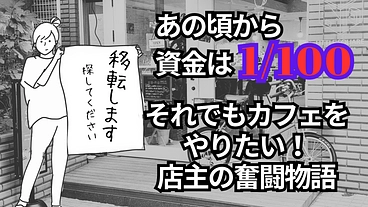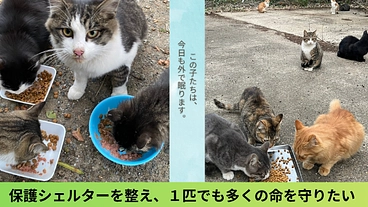支援総額
目標金額 1,500,000円
- 支援者
- 136人
- 募集終了日
- 2024年11月22日
Project Outline <English Version>
Providing expert information on nuclear energy in Japan to the world ~Empowering global citizens for 37 years: Nuke Info Tokyo

The latest information on nuclear power in Japan
"Tell the World"
We are the Citizens’ Nuclear Information Center (CNIC), based in Tokyo, Japan.
Our goal is to achieve a nuclear-free world through empowering citizens with scientific knowledge and solid information.
The Citizens’ Nuclear Information Center (CNIC) was established in 1975 we will celebrate our 50th anniversary next year. We are a non-profit organization that works to realize a society that does not rely on nuclear power, independent of the government and industry. We collect materials on the dangers and problems of nuclear use, conduct research, and provide the information obtained so that citizens can use it for anti-nuclear activities.
We also actively disseminate policy recommendations and publish the monthly "CNIC Newsletter," which summarizes the latest information. In order to deliver information on Japan's nuclear issues to overseas audiences, we publish "Nuke Info Tokyo (NIT)," an edited version of the "CNIC Newsletter" for a global audience, on our English website every other month, and it is available for free viewing.
However, translating nuclear issues requires specialized skills, so we incur expenses such as hiring professional translators.
The reality is that the information provided by the government and the nuclear industry is not always reliable. Therefore, in order to ensure the independence of our information, CNIC has continued to operate through membership fees and donations from members and citizens.
We have decided to try our second crowdfunding campaign with the aim of continuing to steadily provide information to the world and working with as many people as possible to realize a society that does not rely on nuclear power. Even now, 13 years after the Fukushima Daiichi Nuclear Power Plant accident that occurred on March 11, 2011, the accident has not yet been resolved, and the Shika Nuclear Power Plant in Ishikawa Prefecture was damaged in the Noto Peninsula earthquake that occurred on January 1 this year. The world demands information on nuclear issues in Japan, a country prone to earthquakes with 33 nuclear power plants, and we need your support to continue our activities.
We would like to express our sincere gratitude for the huge support we received in our last crowdfunding campaign in 2021, which allowed us to achieve our second goal. We hope that as many people as possible will join us this time as well. Thank you very much.
Crowdfunding to secure funding to continue publishing Nuke Info Tokyo
When NIT began in 1987, it was printed and posted out to readers in Japan and around the world. At this time a subscription fee was charged to readers in Japan, although readers outside Japan were not charged. However, as digital technology progressed and the internet became more widespread, we decided to end the printed version and shift NIT to our website. This was in 2009. Now, when a new edition is uploaded, we send email notifications to all our readers. Of course, anyone looking for information online can also access our articles.
We stopped charging subscription fees when NIT moved online. This was also when we decided that the translation team, even though they were all friends of CNIC and happy to contribute to our mission to realize a nuclear-free world, deserved to be paid for their highly professional and specialized work translating articles for NIT. Although it is half or less than the market rate, our translation team still now receive payment for their work.
Aims of our crowdfunding project
Our main aim is to secure funding to continue publishing Nuke Info Tokyo on our website.
Costs to produce NIT for one year:
Translator wages: 500,000 yen (approx. $3,500)
Staff wages: 1,000,000 yen (approx. $7,000)
TOTAL: 1.5 million yen (approx. $10,400)
If this target is exceeded, we will be able to
- improve the website to make it easier to search for information
- increase the volume of information we upload in each edition of NIT
- upload information in a more timely way
Thanks to the generous support from friends of Nuke Info Tokyo, our previous crowdfunding campaign in 2021 raised 2,080,000yen which covered the production costs of Nuke Info Tokyo for more than one year. Also, since our last campaign, we have been publishing English translations of CNIC statements as soon as possible after issuing the statement in Japanese.
Dr. Takagi Jinzabro and the History of Nuke Info Tokyo
One of the founders of CNIC was Dr. Takagi Jinzaburo (1938-2000), a nuclear chemist who started his career in the Japanese nuclear industry when it was believed nuclear energy would be the answer for Japan’s lack of resources and would power the country’s rapidly expanding economy.
But Dr. Takagi saw the dangers of nuclear energy, both to human health and to our democratic societies. Citizens were excluded from policy decisions on nuclear energy because it was believed to be ‘too difficult’ for the average person to understand, but by leaving all the decisions on what was a potentially catastrophic technology, to the so-called experts, citizens were putting their own lives and the lives of future generations in danger. The answer was to provide information on the risks of nuclear energy so that citizens could understand and make informed decisions about their energy future, the ‘Citizen Science’ approach.

This photo of Dr. Takagi hangs on the CNIC office wall. We feel as though he is still watching over us!

Nuke Info Tokyo (NIT) is the English bi-monthly publication of CNIC. It began when CNIC’s director at the time, Dr. Takagi, attended the Anti Atom International Conference in Vienna in 1986 and was shocked at how little was known about Japan’s nuclear industry and even less about Japan’s anti-nuke movement. Always a strong advocate of international solidarity against the global nuclear industry, Dr. Takagi was determined to publish an English newsletter despite problems of securing financial support and working staff. “Let’s just try 5 or 6 issues and then think again whether to continue” was how NIT started. The latest issue of NIT is our 222nd, thanks to, as Dr. Takagi acknowledged on NIT’s 10th anniversary, “the continuing encouragement and support of international readers.” In the very first edition Dr. Takagi also expressed the “determination” of CNIC to continue publishing NIT into the foreseeable future. It is this determination, as well as the encouragement and support of international readers that has sustained us until today.

Why is this information so important?
We saw during the Fukushima Daiichi nuclear accident, started on March 11, 2011, how important independent, expert information is. Governments and industry tend to withhold information at the best of times and during this catastrophic accident, they simply could not be depended upon to provide accurate and detailed information. So there was a need to get vital information about what was happening inside the nuclear plant and the implications of this, to people around the world who could be affected.
Even today, after 13 years, this accident is far from over. On January 1 of this year, the Shika Nuclear Power Plant in Ishikawa Prefecture was damaged by the Noto Peninsula earthquake. Nevertheless, there are 33 nuclear power plants are in operation in this earthquake-prone country Japan.
We must continue to monitor, on a global level, the nuclear plants and facilities, and the decisions made by authorities, which could affect large numbers of people around the world, and together raise our voices to protect our planet and our future.
The voices of the people of Fukushima must also be heard. 160,000 people evacuated their homes due to the accident and 25,798 people (as of August 1st 2024) have still not returned. Many feel as though their homes and lives, their culture and history have been stolen. They face discrimination, financial, psychological and health problems, yet many want to tell their stories, as painful as they are, so that this will never happen again—to anyone. Just as the hibakusha of Nagasaki and Hiroshima raise their voices so that no one in the world will have to go through the horrors that they experienced, the hibakusha of Fukushima have a message that the world should hear.
NIT/Website Contents
Our specialty is providing information and data regarding nuclear power generation from independent experts. This information covers a number of areas, including:
・TEPCO Fukushima Daiichi nuclear disaster
https://cnic.jp/english/?cat=24
・technical and safety aspects of nuclear reactors
https://cnic.jp/english/?cat=36
・exposure to radiation and health implications
https://cnic.jp/english/?cat=78
・the human and social costs of nuclear power
https://cnic.jp/english/?cat=89
・economic aspects
https://cnic.jp/english/?cat=90
・legal challenges to nuclear power
https://cnic.jp/english/?cat=41
・introducing our readers to individual activists and anti-nuke groups in Japan
https://cnic.jp/english/?cat=14
Message from OurTranslation Team
Tony Boys
I have been proofreading and translating materials for CNIC (mostly NIT articles) since the 1980s. Not only is this work quite (sometimes very) technical, I believe it is part of the legacy of Dr. Jinzaburo Takagi that this work is performed at the highest standard possible in terms of both correctness of factual content and ease of reading for non-technical readers, which is not always an easy ideal to achieve. NIT therefore provides international readers who are concerned about the state of nuclear issues in Japan with high-quality articles on all aspects of Japan’s nuclear scene, including, for example, human rights and other problems faced by evacuees from the Fukushima nuclear disaster in 2011.
My role for NIT is to translate one or two articles for each issue and to proofread the entire issue. I firstly proofread all translations as soon as they are complete and hand them over to CNIC, where all the English articles are read by the editor, the author of the article and other CNIC staff. “Proofreading” here means checking the accuracy of the English translation, the factual content, as well as the readability and, of course, the correctness of the English. I then do a final proofreading of all the content immediately before publication.
I am very happy to say that I feel we are faithfully maintaining Dr. Jinzaburo Takagi’s original concept of providing accurate information on the nuclear industry and anti-nuclear movement in Japan to international readers at a high standard that Dr. Takagi would be proud of. This is all due to the dedication and professionalism of everyone involved in producing each issue of NIT. As Dr. Takagi realized in 1986, it is crucial to have a source of reliable and independent information about the Japanese nuclear industry in English to act as a balance to materials and statements published by the Japanese government and power industry. This role is performed solely by NIT, and hopefully, with your help, we will continue to provide the world with this important information. Thank you!

Acquainted with environmental issues since childhood as a member of the Wasatch Mountain Club in Salt Lake City, Utah, and especially aware of nuclear issues as a down-winder who as a small child witnessed a nighttime atomic bomb test from southern Utah, which lit up a town over 100 km away like daylight, I have been a passionate advocate for environmental conservation and the Precautionary Principle. In volunteer work in the late 1990s, I presented a dosimeter to scientists in Siberia and met refugee children from Chernobyl there. When offered a chance to help the Citizens’ Nuclear Information Center publish Nuke Info Tokyo, I was thrilled to oblige. I think this is a great team of dedicated people who have earned praise from heroes like Arnie Gundersen. It is critically important to keep an eye on the nuclear industry and keep the public informed, as they are the ones that wind up facing the disastrous consequences of poorly considered economizing, as we saw in Fukushima, or human error as we saw at Chernobyl, or haste under pressure as we saw in Tokaimura. As resource constraints put further economic pressure on governments and industries, we must anticipate further shortcuts and more underhanded attempts to transfer the burden to future generations, and call them out whenever we see this.
Nishioka Mayumi
Thirteen years have passed since the Fukushima Daiichi reactor explosions. It is still unknown when the “cleanup” of the melted down reactors will be completed, whatever the word cleanup refers to. However, the Japanese government and industry have not given up on nuclear power. In 2023, the Kishida administration decided on a Basic Policy for the Realization of a Green Transformation (coined “GX”), which seeks the possibility of replacing old reactors with “innovated” ones and enabling the unjustified extension of aged reactors’ lives. Citizens against nuclear power in Japan are making the utmost efforts to halt this policy change.
To my knowledge, Citizens’ Nuclear Information Center is the only organization that periodically reports the latest news on Japan’s anti-nuclear movement in English. We would be very grateful if you could help the organization continue issuing the Nuke Info Tokyo by supporting this crowdfunding project.
Introducing some of our expert writers

Hasegawa Koichi
Environmental Sociologist, Auditor of Citizens’ Nuclear Information Center, Professor Emeritus of Tohoku University, Professor of Shokei Gakuin University
Hasegawa Koichi was a moderator of the international conference held by Citizens’ Nuclear Information Center. He has also given a lecture at one of our seminars. For 600th commemorative issue of CNIC’s monthly newsletter “Tsushin”, he contributed an article on the importance of social watchdog under current situation in Japan where a return to nuclear power policy is promoted, despite the fact that there are still many problems left even 13 years after the Fukushima Daiichi nuclear accident, and the roles of “Tsushin” which have been giving voice to civil society.
https://cnic.jp/english/?p=7492

Goto Masashi
Former nuclear reactor design engineer, member of the Citizens’ Commission on Nuclear Energy
Goto Masashi worked at Toshiba, a major nuclear power plant manufacturer, as a containment vessel design engineer on the Kashiwazaki-Kariwa, Hamaoka and Onagawa nuclear plants. He provided updates during the Fukushima Daiichi disaster and was one of the first nuclear engineers to say publicly that he believed there had been meltdowns. He has written for NIT focusing on design flaws that became apparent at Fukushima Daiichi.
https://cnic.jp/english/?p=4255

Sakiyama Hisako
Director Representative,
3/11 Fund for Children with Thyroid Cancer
Sakiyama Hisako is a medical doctor and after working as a researcher at MIT she was a senior researcher at the National Institute of Radiological Sciences in Japan. She served as a member of the National Diet of Japan Fukushima Nuclear Accident Independent Investigation Commission (NAIIC). She has written for NIT on thyroid cancer in children since the Fukushima Daiichi accident.
https://cnic.jp/english/?p=3610

Matsukubo Hajime
CNIC Bureau Chief
Matsukubo Hajime is the CNIC bureau chief but worked in a financial institution until 2012. He writes many articles for NIT, on a range of topics, including the economics of nuclear power, giving detailed analysis of how governments and industry try to trick us in to believing that nuclear power is cheap.
https://cnic.jp/47001
https://cnic.jp/47439
https://cnic.jp/51404
https://cnic.jp/50004

Kaido Yuichi is one of Japan’s most well-known lawyers who has been involved in many anti-nuke cases. He has written for NIT on some of these cases, including the criminal trial of three TEPCO executives.
https://cnic.jp/english/?p=4580

Seto Daisaku
Secretary General, Incorporated Association Anti-Poverty Network,
Secretary General, Evacuation Cooperation Center
Seto Daisaku is the Secretary General of the Evacuation Cooperation Center which assists Fukushima evacuees. His article in NIT reports on the ground reality, cases where Fukushima evacuees are facing extreme difficulties and how his organization supports them.
https://cnic.jp/english/?p=4331
▶ payment instruction (click here)
▶ Donate 5,000 yen (click here)
▶ Donate 10,000 yen (click here)
▶ Donate 50,000 yen (click here)
リターン
5,000円+システム利用料

NITの継続を応援!コース(寄附金控除あり)
●お礼のメール
●寄付金領収書(2025年1月に郵送)
●活動報告書
※領収書のお名前は住所の宛名に登録いただいたお名前となります。
※複数口でのご寄付も可能です。
- 申込数
- 61
- 在庫数
- 制限なし
- 発送完了予定月
- 2025年4月
10,000円+システム利用料

【お気持ちを上乗せ/1万円】NITの継続を応援!コース(寄附金控除あり)
●お礼のメール
●寄付金領収書(2025年1月に郵送)
●活動報告書
※領収書のお名前は住所の宛名に登録いただいたお名前となります。
※複数口でのご寄付も可能です。
- 申込数
- 61
- 在庫数
- 制限なし
- 発送完了予定月
- 2025年4月
5,000円+システム利用料

NITの継続を応援!コース(寄附金控除あり)
●お礼のメール
●寄付金領収書(2025年1月に郵送)
●活動報告書
※領収書のお名前は住所の宛名に登録いただいたお名前となります。
※複数口でのご寄付も可能です。
- 申込数
- 61
- 在庫数
- 制限なし
- 発送完了予定月
- 2025年4月
10,000円+システム利用料

【お気持ちを上乗せ/1万円】NITの継続を応援!コース(寄附金控除あり)
●お礼のメール
●寄付金領収書(2025年1月に郵送)
●活動報告書
※領収書のお名前は住所の宛名に登録いただいたお名前となります。
※複数口でのご寄付も可能です。
- 申込数
- 61
- 在庫数
- 制限なし
- 発送完了予定月
- 2025年4月
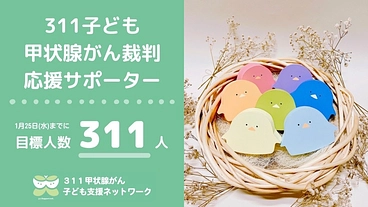
311人募集中!|311子ども甲状腺がん裁判応援サポーター
- 総計
- 275人

「なまけものの通りみち」となる生物回廊農園を共に作り育てましょう!
- 総計
- 58人
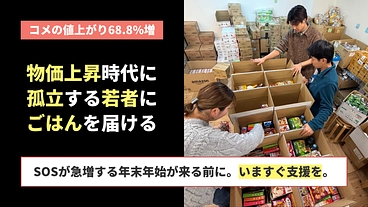
物価高でごはん食べられない若者に今すぐ食糧を|緊急支援2025冬
- 現在
- 11,859,000円
- 寄付者
- 319人
- 残り
- 28日
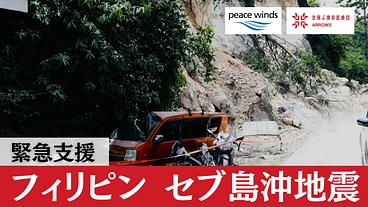
緊急支援|フィリピン地震へのご支援を
- 現在
- 1,628,000円
- 寄付者
- 222人
- 残り
- 9日
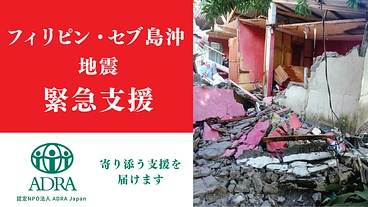
フィリピン・セブ島沖地震|命をつなぐ緊急支援
- 現在
- 186,000円
- 寄付者
- 34人
- 残り
- 9日
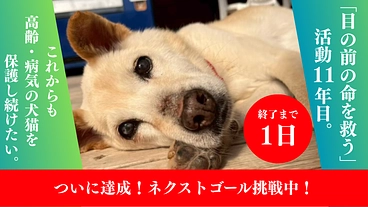
救う命を選ばない。どんな犬猫も保護し続け福岡の里親さんを増やしたい
#動物
- 現在
- 3,194,000円
- 支援者
- 301人
- 残り
- 18時間
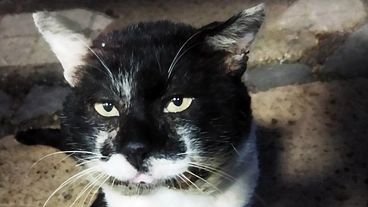
地域の野良猫を守りたい!小さな命にTNRと医療を届けるプロジェクト
- 現在
- 40,000円
- 支援者
- 15人
- 残り
- 2日
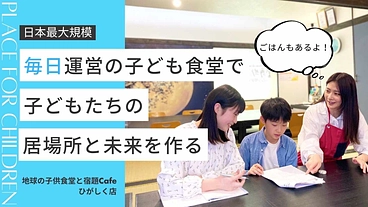
日本最大規模の子ども食堂をつくる!毎日わくわくできる居場所づくり
- 支援総額
- 3,340,000円
- 支援者
- 183人
- 終了日
- 3/11
障がい者就労支援施設で安心安全なハワイコーヒーをお届けプロジェクト
- 支援総額
- 1,285,000円
- 支援者
- 77人
- 終了日
- 7/16
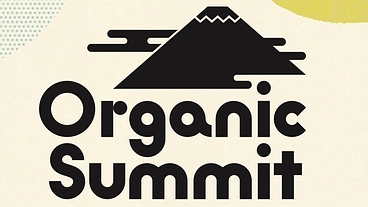
富士の麓でオーガニックサミットを開催、日本中で繋がりたい!
- 支援総額
- 357,500円
- 支援者
- 38人
- 終了日
- 10/9
北海道の希少な野生動植物を“絶滅の危機”から守りたい。
- 寄付総額
- 1,259,000円
- 寄付者
- 74人
- 終了日
- 12/27
「1986 日本GP オートバイレース」の高画質リマスター
- 支援総額
- 563,000円
- 支援者
- 51人
- 終了日
- 3/28
福島で始まる障がい者スキースクールの専用器具購入にご協力を!
- 支援総額
- 529,000円
- 支援者
- 44人
- 終了日
- 12/25
駆除された鹿の命の紡ぐ、しっとり滑らかなレザーサンダル製作
- 支援総額
- 443,000円
- 支援者
- 20人
- 終了日
- 6/18
